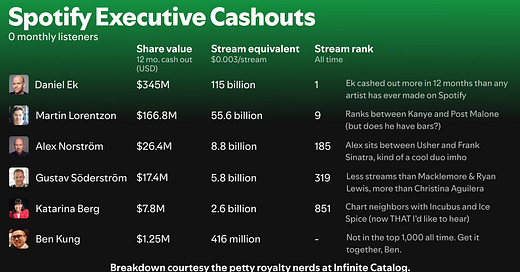🤑 Spotify exec cashouts but make it streams/artists
In related news, Spotify is paying songwriters and publishers $150m less per year now
Hey everyone, I’ve been getting some nice responses to the latest posts, so wanted to start with a quick thank you.
Much of the writing I do here is related-but-ultimately-tangential to my day job of building the best dang royalty accounting software and service company, but my main goal has always just been to help artists get paid and expose bullshit in the music industry, so it means a lot that the wider-angle writing I do here is resonating.
Please do keep the replies coming (maybe even in the comments?!) and if you feel like it, find me on LinkedIn, share these posts far and wide, or subscribe if you haven’t already.
Now on to some news from last week that caught my attention:
To quickly recap the second part: Spotify is now including audiobooks in all their paid music tiers and reclassifying those tiers as “bundles.” By their own admission, the intention is to lower what they pay to songwriters:
In a sense, this means that songwriters and publishers are now paying audiobook royalties out of *their* pockets. But of course, robbing Peter (a songwriter) to pay Paul (an author) would not actually benefit Spotify itself, so it’s worse than that.
In addition to this redistribution from songwriters who drive Spotify subscriptions to authors who almost certainly don’t, bundling takes advantage of a 2022 legal settlement called Phonorecords IV, which allowed that bundles can pay lower mechanical royalties to songwriters and publishers.
Taking full advantage, Spotify is now estimated to save $150 million off their annual royalty payments to those pesky songwriters and publishers.
(The Mechanical Licensing Collective, the non-profit created by 2018’s Music Modernization Act to issue blanket licenses and collect mechanical royalties from streaming services on behalf of songwriters and publishers, is suing Spotify on their behalf).
Between those savings, laying off 2,300 people in 2023, and not spending mountains of cash on podcasts, Spotify’s share price has been on a tear, more than doubling in the past 12 months, during which time a handful of Spotify execs have cashed out well over half a billion dollars, helpfully delineated in that MBW article.
As a humble royalty accountant, this got me thinking:
How many streams would it take to earn these amounts on Spotify itself, and where would that place these executives in the ranks of artists on the platform?
So without further ado, here’s the breakdown, and below is a petty-ass graphic. We used $0.003/stream (generous), and assumed 100% control over the IP in the comps (never the case), which means it’s actually worse than this:
Does this seem ridiculous? Of course it does. Especially when you consider that this is just the cash outs in the last 12 months.
That said: I personally don’t think that Ek and the Gang are “good” or “bad” as people, and the point of this isn’t to shame them. As the saying goes, they exist in the context of all that came before them. They did not just fall out of the coconut tree.
The bad actor here imho is the same as always: misaligned incentives that fail to appropriately share the wealth amongst stakeholders, aka late-capitalism. These people are just doing a good job of hitting the misaligned marks, and I don’t feel it’s true or useful to think of them as evil geniuses out to steal money from artists.
Instead I want to use it as a jumping off point for discussion of how incentives could be better aligned.
How could a streaming service better share the wealth amongst all stakeholders, including the labor (artists, songwriters, rightsholders) that the platform gets built off of in the first place?
I’m biased, but a streaming service with a profit share mechanism on top of royalty payouts feels like an answer worth exploring.






I lol’d hard at the Kamala quote.